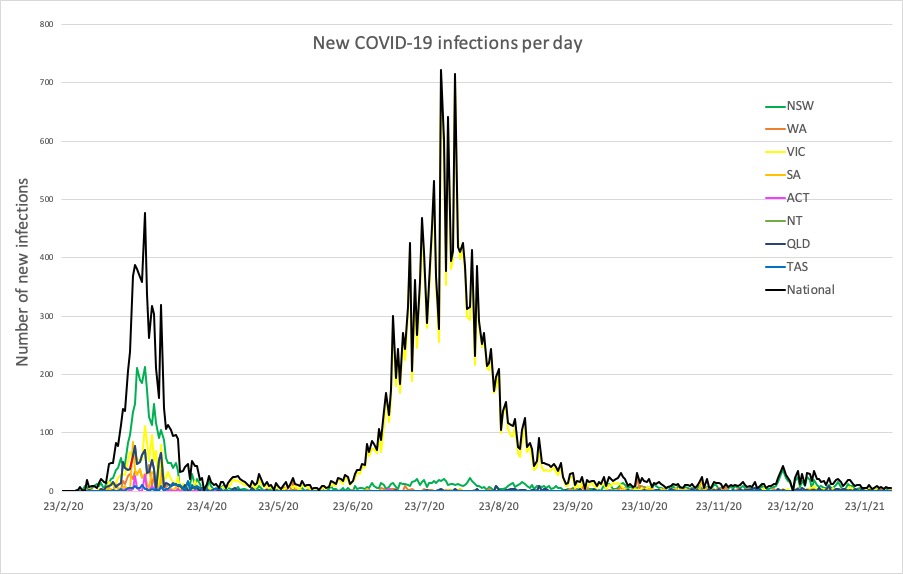And BMJ editor decries political mishandling of pandemic as 'social murder'.
Welcome to The Medical Republic’s COVID Catch-Up.
It’s the day’s COVID-19 news in one convenient post. Email bianca@biancanogrady.com with any tips, comments or feedback.
4 February
- Victorian quarantine hotel worker tests positive to SARS-CoV-2.
- BMJ editor suggests political mishandling of pandemic constitutes ‘social murder’.
- ED visits for mental health, overdose, domestic violence increase in US during pandemic.
- Latest confirmed COVID-19 infection numbers from around Australia.
Another hotel quarantine staff member has tested positive to SARS-CoV-2, this time in Victoria at a hotel that was accommodating players and staff for the Australian Open. The case has prompted the state to introduce public health measures to curb possible spread of the infection.
The staff member at the Grand Hyatt tested positive yesterday after developing symptoms, although all hotel staff are tested daily, according to the Victorian health department.
Authorities have released a list of sites that the worker had visited between 30 January to 1 February when they may have been infectious, including a Kmart, Coles and Bunnings.
Victorians are now limited to no more than 15 household visitors at one time, masks are mandatory in public indoor spaces, and the government has maintained the current limit of no more than 50% of staff returning to work in offices, delaying the planned loosening of that cap.
‘Social murder’… ‘public health malpractice’ … ‘gaslighters-in-chief’. Executive editor of the BMJ Kamran Abbasi hasn’t pulled his punches in analysing the political mishandlings that have contributed to the deaths of more than two million people from COVID-19 around the world.
In a striking editorial, Abbasi asks whether the concept of ‘murder’ might apply to the political and leadership failures that have occurred during the pandemic.
“When politicians and experts say that they are willing to allow tens of thousands of premature deaths for the sake of population immunity or in the hope of propping up the economy, is that not premeditated and reckless indifference to human life?”, he writes. “When politicians wilfully neglect scientific advice, international and historical experience, and their own alarming statistics and modelling because to act goes against their political strategy or ideology, is that lawful?”
He argues that the lack of political attention given to social determinants of health and inequalities, that have seen the burden of COVID-19 disproportionately fall on the poor, minorities and the disadvantaged, may be described as ‘social murder’ – a term coined in the 19th century.
While the international definition of crimes against humanity doesn’t include public health, Abbas suggests that the international threat posed by the pandemic means governments should be held accountable to the international community for their failures and public health malpractice. They will also be held accountable at the ballot box.
The median number of emergency department visits during the COVID-19 pandemic in the United States last year were similar to those seen in the previous year, but numbers of visits for mental health conditions, suicide attempts, overdose and domestic violence were all higher.
In a paper in JAMA Psychiatry, researchers examined nationwide registry data from more than 187 million ED visits between January 2019 to October 2020. This revealed an initial dip in the number of emergency department visits in the first few weeks of March 202, coinciding with the first peak of the pandemic in the US, after which overall ED visits each week returned to pre-pandemic levels.
However they noted significant increases in visits for mental health concerns, suicide attempts and opioid overdose from January 2020 and right throughout the study period, but particularly from late March 2020.
Visits relating to intimate partner violence were also significantly higher from early in the year through to July, compared to the same period the previous year. Visits for suspected child abuse or neglect were also higher than in 2019 and steadily increased throughout the study.
South Australia recorded four cases in returned travellers in quarantine, and NSW recorded two. There were no cases of community transmission reported.
Here are the latest confirmed COVID-19 infection numbers from around Australia to 9pm Wednesday:
National – 28,829 with 909 deaths
ACT – 118 (0)
NSW – 5114 (2)
NT – 98 (0)
QLD – 1311 (0)
SA – 601 (4)
TAS – 234 (0)
VIC – 20,449 (0)
WA – 904 (0)



